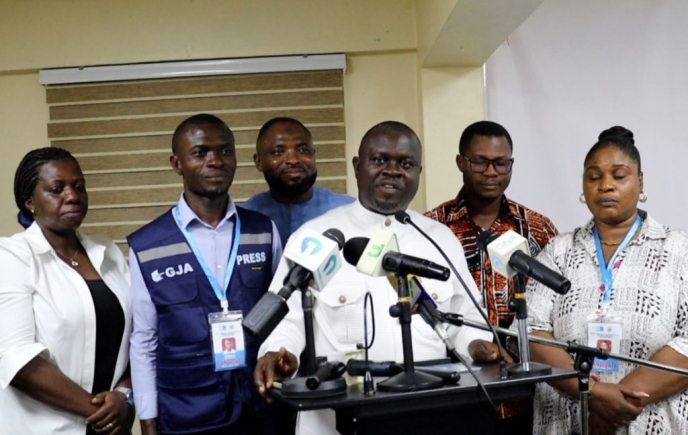The Ghana Journalists Association (GJA) has raised grave concerns over the increasing spate of attacks on journalists and has issued a seven-day ultimatum to the Ghana Police Service to provide updates on all reported incidents, prosecute perpetrators and implement measures to protect media personnel or face a nationwide media blackout of police activities.
The GJA President, Albert Kwabena Dwumfuor, addressing a press conference in Accra yesterday, said the association could no longer remain silent while journalists were assaulted, intimidated, or arrested in the line of duty.
“This is not a threat, it is a necessary action to defend the dignity and safety of every Ghanaian journalist,” he said.
Mr Dwumfour described the situation as a direct attack on democracy and called the inaction of law enforcement a breach of the Constitution.
Over the past seven months, the GJA has recorded more than a dozen attacks on journalists, including the recent assault on Emmanuel Banahene of EIB Network and Salomey Nartey of JoyNews during the Ablekuma North parliamentary by-election.
“Despite video evidence implicating a senior police officer, we are yet to see concrete action. Charging alone is not justice, justice must be seen to be done,” Mr Dwumfour stressed.
Among other things, the GJA President demanded a public update on all investigations, transparent prosecution of offending officers, disciplinary action against violent operatives, and preventive measures such as training security personnel on media rights.
He also condemned the detention of a JoyNews journalist and his cameraman during the demolition of a MacDan warehouse, calling it censorship through force.
He said although the GJA welcomed President John Dramani Mahama’s recent statement on the matter, it insists that symbolic gestures were not enough and, therefore, there was a need for a swift government action.
Mr Dwumfour further announced a five-point response plan by the association should the security institutions fail to act.
This includes initiating civil suits against the perpetrators, working with both local and international human rights organisations to document and pursue justice, and lobbying embassies of countries such as the United States, United Kingdom, Canada, France and the European Union to impose travel bans on abusive security officials.
The GJA will also petition the United Nations, African Union, ECOWAS and UNESCO to impose international sanctions on offending officers, including blacklisting them from peacekeeping deployments and overseas postings.
Domestically, the association plans to urge security agencies to bar such officers from promotion and enforce internal disciplinary procedures.
These steps, the GJA is convinced, are critical to defending press freedom and safeguarding the role of journalists in Ghana’s democratic space.
He said the association would also begin publishing names and photos of identified attackers in a monthly Press Freedom Watchlist.
Professional, responsible reporting
Touching on rising insecurity in parts of the country such as Bawku, Ashaiman, and Nkwanta, the GJA President urged journalists to be professional and responsible in reporting from conflict-prone areas.
“Media freedom does not mean irresponsibility.
Let us report to heal, to unite, and to build,” Mr Dwumfour noted, adding that journalists who incite violence or peddle falsehoods would not be shielded from legal consequences.
“The GJA reaffirms its commitment to press freedom.
We will not be silent.
We will not be intimidated and we will not allow the enemies of press freedom to win,” he said.

